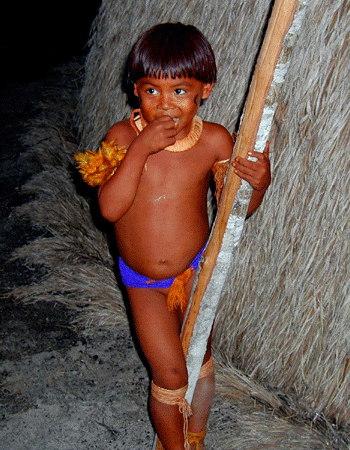Tensions are flaring after Brazil’s approval of the Belo Monte dam project last month to divert the flow of the Xingu River. The dam, which will be the world’s third larges, will flood 500 square miles of rainforest, lead to the removal of at least 12,000 people in the region, and upturn the lives of 45,000 indigenous people who depend on the Xingu. After fighting the construction of the dam for nearly thirty years, indigenous groups are beginning to talk of a last stand.
“I have asked my warriors to prepare for war and I have spoken of this with other tribes from the Upper Xingu. We will not let them [build the Belo Monte Dam],” Chief Raoni Metuktire, of the indigenous Kayapo tribe in Brazil, told the French Channel TF1. He is currently traveling through Europe appealing for support in putting the brakes on the project.
Another group of Kayapo, led by Chief Megaron Txukarramãe, have set up a blockade of a ferry crossing on a major Amazonian highway over the Xingu River in Mato Grosso in protest against the dam. As of last week the blockade was nearing its 30th day.
 A Kayapo boy (or Kaiapo, Caiapo) in Brazil. Photo by: Sue Wren. |
Chief Megaron recently called Brazil’s President Lula “enemy number one” of indigenous people in Brazil, and has said that his people are prepared to “die fighting for our rights.”
The Brazilian government argues that the dam, which was originally proposed in the 1970s under a military dictatorship, is necessary for increasing energy demands in the country. The 11 to 17 billion dollar dam will provide energy to 23 million homes, yet during three to four months of the year the dam will only run 10-30 percent capacity due to low waters. Critics argue that for the dam to be at all viable—and economical—other massive dams will need to be built on the Xingu River as well.
“Indigenous people are determined to disrupt the ‘business as usual’ model of destructive development projects that ruin the environment and their traditional ways of life,” said Atossa Soltani of Amazon Watch, an environmental and indigenous-rights group, in a press release. “Indigenous groups from the Xingu Basin have sent the Brazilian government a clear and resounding message that they will not allow the Belo Monte Dam to move forward. A Brazilian and international coalition of organizations and social movements stands in solidarity with these groups, and is mobilizing further social and legal actions.”
The issue recently gained wider media attention as James Cameron, director of Avatar, and several cast members protested against the dam in Brazil. Cameron also visited indigenous groups in the area that will be directly impacted by the dam.
Although construction has not yet started, the government says that the dam will be online by 2015. While hydroelectricity usually does not produce as much carbon as burning fossil fuels, studies have shown that dams, especially those in the tropics, emit significant amount of methane—a greenhouse gas which is approximately 20 times more potent than carbon—due to rotting vegetation in reservoirs.
Related articles
Off and on again: Belo Monte dam goes forward, protests planned
(04/20/2010) An auction to build the Belo Monte dam, a massive hydroelectric project in Brazil, is going ahead despite two court-ordered suspensions, both of which have been overturned. The dam, which would be the world’s third-largest, has been criticized by indigenous groups, environmental organizations, and most recently filmmaker James Cameron who created the wildly popular Avatar.
(04/01/2010) After creating a hugely successful science-fiction film about a mega-corporation destroying the indigenous culture of another planet, James Cameron has become a surprisingly noteworthy voice on environmental issues, especially those dealing with the very non-fantastical situation of indigenous cultures fighting exploitation. This week Cameron traveled to Brazil for a three-day visit to the Big Bend (Volta Grande) region of the Xingu River to see the people and rainforests that would be affected by the construction of the Belo Monte Hydroelectric Dam. Long-condemned by environmentalists and indigenous-rights groups, the dam would destroy 500 square kilometers of pristine rainforest and force the relocation of some 12,000 people.
Environmentalists and indigenous groups decry approval of massive dam in Amazon
(02/02/2010) The approval of the hydro-electric Belo Monte Dam from the Brazilian environmental agency, IBAMA, has raised condemnations from environmentalists and indigenous groups. The dam will divert the flow of the Xingu River, a tributary of the Amazon River, which runs through the Amazon in northeast Brazil. According to critics the dam will destroy vast areas of pristine rainforest, disrupt sensitive ecosystems, and relocate 12,000 people.